Cannabis and the Gridiron
Is there a place for marijuana in American football?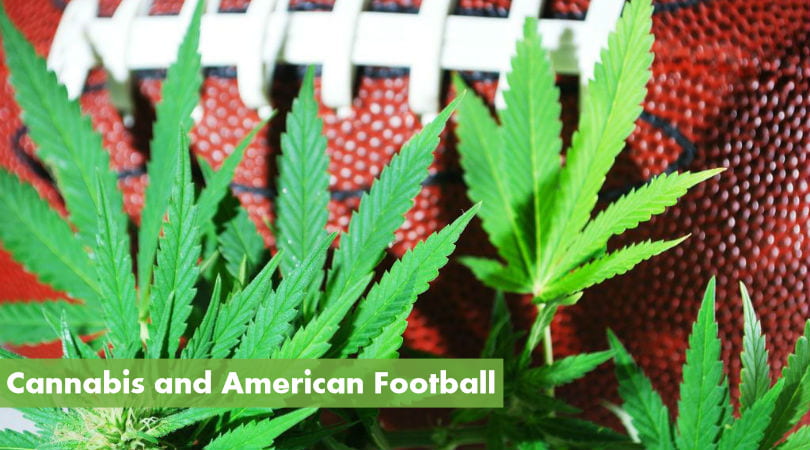 We like to think of the sports world as being a microcosm for what is going on in the rest of the planet. And since the United States started a war on drugs, so has the different sports leagues. Many of the substances we have fought against have a reason to be battled. Some do not. One in particular is making a rise again in both the real and the sports world. Cannabis.
We like to think of the sports world as being a microcosm for what is going on in the rest of the planet. And since the United States started a war on drugs, so has the different sports leagues. Many of the substances we have fought against have a reason to be battled. Some do not. One in particular is making a rise again in both the real and the sports world. Cannabis.
Today we will be speaking directly about the sordid relationship football and marijuana have been engaged in for decades. What’s real, what isn’t. And if there stand a practical use for cannabis in football.
When someone brings up marijuana and football my mind goes two places: former running back Ricky Williams, and wide receiver Josh Gordon. Both are, or were, extremely talented athletes. At the highest level of their craft.
Ricky Williams
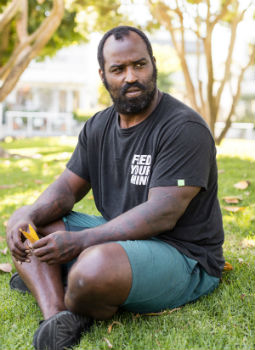
Ricky Williams
A little background is due. Ricky Williams was a star running back for the Texas Longhorns between 1995-1998. The two-time All-American, and Heisman Trophy winner was drafted 5th overall in the 1999 NFL Draft by the New Orleans Saints in a record-setting trade deal, as the Saints head coach Mike Ditka made the choice to trade every available draft pick that year, and two from the next season for the right to draft 5th overall. He played well during his tenure for the Saints.
In 2002, Williams was traded to the Miami Dolphins. His career went on as a top-rated running back after joining the Dolphins, but it wasn’t all roses and unicorns for Williams. Known by his teammates to be standoffish, a keep-to-himself-type of guy, Williams was though of as an oddball. Former Saints teammate WR Joe Horn would say, “People he wanted to deal with, he did. People he didn’t, he didn’t. No one could understand that.”
It would come out later that Ricky suffered from social anxiety. A mental health issue that makes even the most popular people reclusive. In its worse forms it is absolutely debilitating. It can keep those who suffer from it seclude themselves from even their closest loved ones. Not exactly knowing why.
Anti-depressants and benzodiazepines are among the most common drug treatments out there, according to the Mayo Clinic’s information page on the disorder. Both of these types of drugs have a history of misuse potential. Neither of which were an option for Ricky.
And then you add the pain that comes from being a running back in the NFL. Injuries had been part of his career, and so, treatment for them had also been present. Opioids are the most common treatment, and we know too well the potential for misuse when it comes to those.

His career went on as a top-rated running back after joining the Dolphins.
Ricky Williams took (takes) his health very seriously, never wanting to put things in his body that could have negative effects. Eastern medicine, yoga, meditation, and yes, cannabis, had been his go-to for years to treat his ailments. And in 2004, the world found out.
Ricky would retire from football that year, and football fans everywhere would condemn him for it. On the surface, it looked as if his retirement after another failed drug test for marijuana was just so he could continue his use of the substance. In his own words, he would say it was to better heal himself, mentally and physically.
Ineligible to play in 2004 after his 3rd failed test, he came back to football in 2005 after serving a 4-game suspension for violating the league’s substance abuse policy. And would be suspended for another year in 2006 for the same reason. He would play for the Dolphins and the Ravens until 2011.
Josh Gordon
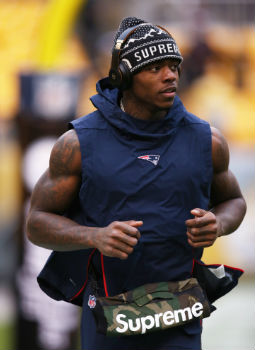
Josh Gordon
Josh Gordon played his college football at Baylor University. A star wide receiver, he played only two seasons at the Texas school, as his troubled past followed him everywhere he went.
Prior to choosing which of the many Division I schools he would take his talents to, him and a friend were found asleep in a car, sitting in a fast-food drive-thru lane, and Gordon would be placed on probation, which wouldn’t allow him to leave the state.
After a failed drug test at Baylor in 2011, Josh was suspended indefinitely by the program. He would transfer to Utah, but not be eligible to play. In the 2012 NFL Supplemental Draft, the Cleveland Browns selected him with their 2nd round pick, and his talent for catching the football immediately showed.
But just a year into his NFL career, the first suspension for violating the league’s substance abuse policy would present itself. Gordon was suspended for the first 2-games of the 2013 season. Despite missing those games, he would lead the league in receiving yards, and be named to the Pro Bowl, as well as the first-team All-Pro lists. But like with Williams, it wasn’t all good after that.
Gordon would be arrested for DWI in the 2014 offseason, and would ultimately miss 10 games due to a suspension for his 2nd violation. Another list of failed drug tests would lead to him missing the 2015 and 2016 seasons.
He would be reinstated for the end 2017 season, and road that train into 2018, where he would be traded to the New England Patriots, after playing 1-game for the Browns. That season would last just 12 games, as he would yet again be suspended for a diluted sample, which is deemed a failed drug test by just about every place that requires urine samples for testing.
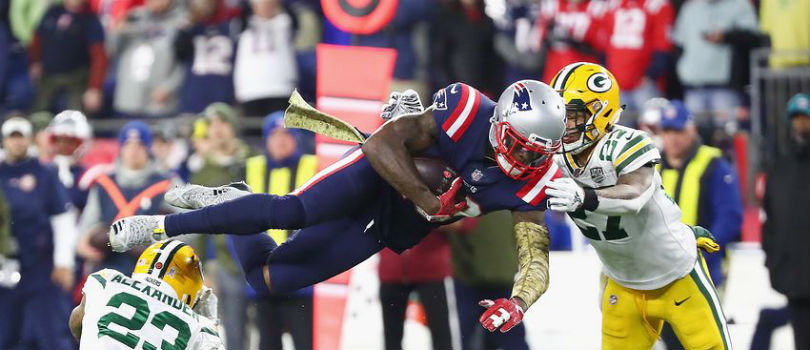
Josh Gordon, Playing for New England Patriots.
Mental health issues, and no doubt the treatment for injuries he has suffered throughout his career has led to these issues with substance abuse. It’s no secret he comes from a troubled background, and also suffers from social anxiety.
It should be noted that the NFL and the New England Patriots have stood beside Josh during this most recent event. Securing his services for the 2019 season, guaranteeing him a contract and accrued years towards free agency rights, pension, and post-NFL healthcare. He has recently applied for reinstatement, but nothing as of press time has been announced.
How could the perception of cannabis changed their career trajectory?
Ricky Williams and Josh Gordon represent the extremes when it comes to how the perception of marijuana in football has been recently. No doubt the rules are in place for a reason, and their violations of said rules are what ultimately led to the negative consequences, but what could have been done to mitigate the end results?
As with all treatments for anything that ails the body or mind, a conversation could have been had. Why do today’s players reach for cannabis? Is it strictly for recreation? Or is it for treating something that the rest of the world has yet to catch up to?
Mental Health
It is well-known that marijuana lacks the properties to produce a physical addiction. We also know from recent studies that it doesn’t enhance performance. So why is it that we see its use so prevalent in today’s game?
Well, first, to rightfully understand how addiction works, one needs to consider the mind, as well as the body. People become addicted to things that aren’t substances all the time, like shopping, gambling, sex, and food. These produce a chemical response in the brain’s reward system that is positive to the individual. And the brain seeks out this response once it feels it the first time.
We won’t get too far into this, except for the way that the use of cannabis to treat mental health issues has come apparent in recent years. Self-medication has always been an issue, but it comes to this aspect-while negative consequences occur-using cannabis as a treatment has been repeatedly shown as a safer alternative that prescription drugs. That begs the question; why is football still behind the times?
Stigma. Football is a “man’s sport”. And for far too long, mental health issues have been regarded as a weakness. So, big strong football players shouldn’t show it. But players like WR Brandon Marshall and former safety Brian Dawkins have recently spoken out, raising awareness and trying to beat the stigma of mental health issues. The search for viable treatments outside of dangerous prescription drugs continues, and cannabis is leading the way.
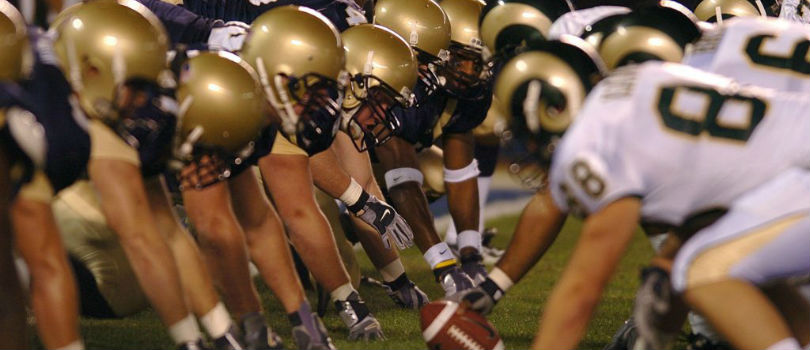
For far too long, mental health issues have been regarded as a weakness.
Physical Health
We have already established that football is a rough sport on the body. Every time a player steps on the field an injury can occur. It could be as minor as a bruise, or as major as torn ligaments and tendons, but it is always a possibility, and happens at a very high rate.
How does football treat these injuries? Just like anywhere else in the country, either with over-the-counter medications like ibuprofen (Advil, or Motrin), or naproxen (Aleve). Or with more powerful drugs like opioids (hydrocodone, oxycodone, and morphine). Both of which can have long-term ramifications if over-used.
We can find studies and applications world-wide for cannabis products in use today for treatment of different types of pain. Muscle spasms, migraines, nerve pain, and inflammation. New pathways to treatment pop up all the time where marijuana, or at least the cannabinoid without the psychoactive properties can be found.
Regulation
Regulating use and access is a prevailing argument in the inclusion of cannabis as treatment in sports. Many professional athletic leagues across the world allow it to be used during non-competitive phases of the year. New ways of testing for the presence cannabis can determine when, and at what dosages are being used, so progress among other sports is happening.
Legally, only a fraction of the states have accepted marijuana, at least medicinally. But hemp-derived non-psychoactive cannabidiols (CBD) is available legally across the country, and many of the health benefits are present, yet it still remains on the banned substances list.
Tracking the ways that cannabis and its derivatives are accessed is a hurdle that stands in the way of progress. Even with the legalization across the country, the black market still exists.
Administration is also key, as the way one ingests cannabis can determine efficacy. Smokable marijuana has many drawbacks, including decreased motor skills, lung damage, hypotension, and increased heart-rate. Anxiety and depression are also present in long-term use.
Regulating dosage and exposure is something that needs to be considered as well. Tests have shown that increased use at higher dosages can produce the effects of tolerance, making the healthy properties ineffective over time. But in steady, lower dose increments, the desired results can be the same over time.
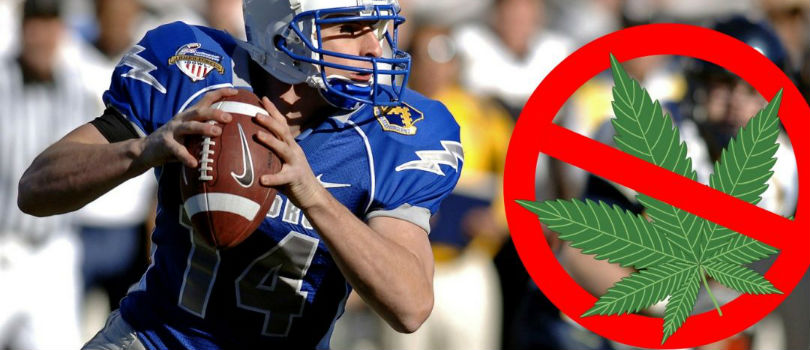
CBD is available legally across the country, yet it still remains on the banned substances list.
Conclusion
As we try to find the balance between the most beneficial and safest ways to treat health issues, we cannot ignore the fact that many people in sports (especially football) have decided to use cannabis for pain, and mental health issues. And with society starting to change the way marijuana is perceived, the sports world needs to follow-suit.
Long gone are the days of Reefer Madness. Where fear and an overall lack of education on how cannabis actually effects the body reigned supreme. Today we know, not everyone who uses marijuana does so for the simplified action of getting high. Chemical imbalances in the brain, and pain experienced due to athletics, trauma, and disease have resulted in a multitude of applications.
But more education is needed. Still, more acceptance is needed. And in order to reach both arenas, we must continue the dialog.
More and more athletes are coming forward about their mental health, reducing the stigma, and are seeking treatment. The same can be done for new and better ways to get help for those ailments.
We still don’t know everything about the risks and benefits of using cannabis as a viable medicine. But with all of the evidence pointing to positive results, and most negative reactions dealing with the perception of cannabis alone, times are changing.
And we believe that yes indeed, marijuana has a place in football.
